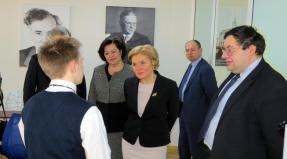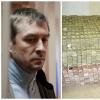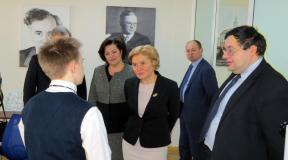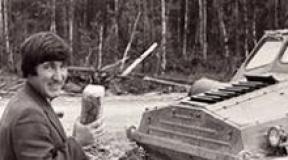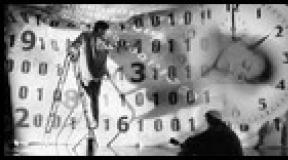Sergey MIA Bank escaped. A major official appeared in the case of Zakharchenko’s father
Instead, ex-official Bondarenko will tell about the money of the Zakharchenko family.
The criminal case against Viktor Zakharchenko, the father of the notorious Colonel Dmitry Zakharchenko, is not formally connected with the investigation against his son. However, the investigation has little doubt that the father’s fictitious employment for a position at the Moscow Mortgage Agency (MIA) was a form of bribe for patronage of the credit institution by Zakharchenko Jr. In this regard, the testimony of the recently arrested former chairman of the board of the bank, Vladimir Koryevkin, will be very important for the investigation. Now Sergei Grib, who replaced Koryevkin in the position, has also come into the sight of law enforcement officers, but it is unlikely that they will be able to interrogate him - the banker has left Russia.
The emergence of a new defendant in the case of embezzlement of bank funds became known during a meeting of the Basmanny Court, where two of its defendants - Viktor Zakharchenko and the former chairman of the board of the credit institution, Vladimir Koryevkin - had their arrest period extended until August 30. As lawyer Vyacheslav Leontyev, who represented the interests of Vladimir Koryevkin, said, Sergei Grib became his client’s successor as chairman of the board of MIA Bank. “Vladimir Koryevkin had Viktor Zakharchenko as an adviser for eight months, and Grib for almost a year and a half,” said lawyer Leontyev, “from April 2015 until September 2016, when Zakharchenko was fired after the arrest of his son Dmitry.”
Vyacheslav Leontyev also said that his client does not deny that he hired Viktor Zakharchenko as an adviser in September 2014, but claims that “he did this on the orders of the founder’s representative - an employee of the Moscow City Property Department.” Lawyer Leontyev refused to name the official, citing the non-disclosure agreement he had given. Meanwhile, according to Kommersant, one of the witnesses in the case is the former deputy head of the department, Gleb Bondarenko (dismissed in 2015).
“Vladimir Koryevkin complied with this instruction,” continued Vyacheslav Leontyev. “Especially since he was assured that Viktor Zakharchenko would be involved in the development of the bank. In fact, Vladimir Koryevkin did not even know Viktor Zakharchenko. For the first time he saw him only at the last meeting of the Basmanny Court ". Before this, according to the lawyer, the banker only signed salary slips for Zakharchenko Sr., whose salary was almost 150 thousand rubles a month.
During Vladimir Koryevkin’s work at MIA Bank (in April 2015, he moved to BBR Bank), according to investigators, Viktor Zakharchenko, as an adviser to the vice president of a credit institution, received at least 1.5 million rubles. Under Vladimir Koryevkin’s successor, Sergei Grib, payments to Viktor Zakharchenko continued, and he received another 2.5 million rubles before his dismissal.
Sergei Grib left the post of Chairman of the Board of MIA Bank in March 2017 and immediately went abroad, from where he has not yet returned. “Apparently, the investigation found him guilty of embezzlement of MIA Bank funds,” noted Mr. Leontyev. “And that’s all we know today.” Mr. Leontyev considers the accusations against his client Koryevkin to be groundless. “Vladimir Koryevkin was hired as chairman of the board of MIA Bank in order to increase its profitability from 200 million to 450 million rubles a year, but actually raised it to 650 million rubles,” said Vyacheslav Leontyev, “for this he was promised a bonus of 10 million rubles , but they were never paid. After his dismissal, Vladimir sued for this bonus. And after all this, someone says that he caused damage to the bank of 1.5 million rubles. This is ridiculous! "
As the Ruspres agency has already reported, Viktor Zakharchenko was arrested on March 31, and Vladimir Koryevkin on April 26. Both were charged with Part 4 of Art. 160 of the Criminal Code of the Russian Federation (embezzlement), providing for up to ten years in prison.
MIA Bank, which was recognized as the injured party in the case, declined to comment. 100% of the shares of this credit institution belong to the city of Moscow, and the main direction of the bank’s work is providing mortgage loans to residents of the capital within the framework of existing targeted programs.
Billions of Colonel Zakharchenko came to the safe house from MIA Bank, which is headed by the son of Alexander Voloshin
Ilya Alexandrovich Voloshin. The gray cardinal cashed out. On the rise of a career.
Here they knocked on top of us and gave us reason to think about the origin of the cash found in the apartment of Colonel Dmitry Zakharchenko.
We found there, to be precise (and we are always accurate), 374,809,230 rubles, €2,076,220 and $124,274,274, which, if rounded and translated at the exchange rate, is 9 billion rubles.
Now these “yards” have already been turned into state income, but where they came from, who, so to speak, put them into circulation, is still an interesting question.

Colonel Zakharchenko and his 9 “yards”.
Indeed, well, these billions did not move directly from Goznak to the colonel’s apartment.
And this famous state printing house was not noticed in printing dollars or euros on an industrial scale. Accordingly, there was another “printing press” that cashed out such volumes that drove even Neglinnaya crazy.
Our superior citizens were jealous of such unfair competition and, with the help of the Investigative Committee, found out that Goznak Zakharchenko was located in the Moscow Mortgage Agency bank - it was through it that most of the “colonel’s yards” were cashed.

Moscow. Seliverstov lane, building 4, building 1. "Goznak Colonel Zakharchenko" - office of the bank "Moscow Mortgage Agency"
The management of this bank, represented by the chairman of the board Sergei Grib and his deputy Vladimir Koryevkin, became involved in a criminal case of embezzlement, in which the colonel’s father, Viktor Zakharchenko, is also involved.

Father of Dmitry Zakharchenko under escort
According to investigators, both bank managers fictitiously employed a relative of a police officer in 2014 and paid him more than four million rubles over the next two years. Koryevkin and Zakharchenko Sr. are in custody.

Fugitive banker Sergei Grib is able to shed light on the secret of Colonel Zakhachenko’s billions
Sergei Grib managed to escape abroad (he was recently put on the international wanted list). The prosecutor's office is confident that it is Sergei Grib who is able to shed light on the mystery of the origin of the billions found in Zakharchenko's apartment.
But in order to fully understand the situation, it is important to understand that not only Zakharchenko Sr., but also Voloshin Jr. was employed by this bank.

Father and son Voloshina. Two gray cardinals.
Ilya Aleksandrovich Voloshin, the son of Alexander Stalyevich Voloshin, the former head of the Kremlin administration, came to the position of adviser to the chairman of the board of the MIA on February 11, 2016. That is, seven months before the search in Zakharchenko’s apartment.
And, as expected, it was the son of the former “gray eminence of the Kremlin” who became the guarantor of the uninterrupted operation of the “printing press” for the colonel’s apartment and its “tenants.”

Voloshin Ilya Aleksandrovich - acting General Director and Chairman of the Board of CB "MIA". Screenshot from the bank's official website
Cashing out is always dangerous, and especially in such volumes. You can’t do without a special “party” “roof” here. Ilya Voloshin began to watch from this very “roof” at the work of the “printing press”. That is why the massive purge of the banking sector by the MIA did not even stir. Although nearby banks were put under the knife for an extra sneeze...
An unexpected search confused all the cards. The official management of the bank was partly on the run, partly stuck under investigation. And the MIA itself, as if nothing had happened, continues its work under the leadership of the Acting General Director and Chairman of the Board Ilya Aleksandrovich Voloshin.
Apparently, we need to fill new square meters with billions of new cash. Elections are just around the corner in our country, if anything...

The beginning of the career of the gray eminence was revealed by Ilya Voloshin
Formally not related to the investigation against his son. However, the investigation has little doubt that the father’s fictitious employment for a position at the Moscow Mortgage Agency (MIA) was a form of bribe for patronage of the credit institution by Zakharchenko Jr. In this regard, the testimony of the recently arrested former chairman of the bank's board, Vladimir Koryevkin, will be very important for the investigation.
Now, Sergei Grib, who replaced Koryevkin in the position, has also come into the sight of law enforcement officers, but it is unlikely that they will be able to interrogate him - the banker has left Russia.
Vyacheslav Leontyev also said that his client does not deny that he hired Viktor Zakharchenko as an adviser in September 2014, but claims that “he did this on the orders of the founder’s representative - an employee of the Moscow City Property Department.” Lawyer Leontyev refused to name the official, citing the non-disclosure agreement he had given. Meanwhile, according to Kommersant, one of the witnesses in the case is the former deputy head of the department, Gleb Bondarenko (dismissed in 2015).
“Vladimir Koryevkin complied with this instruction,” continued Vyacheslav Leontyev. “Moreover, he was assured that Viktor Zakharchenko would be involved in the development of the bank. In fact, Vladimir Koryevkin did not even know Viktor Zakharchenko. For the first time he saw him only at the last meeting of the Basmanny Court ". Before this, according to the lawyer, the banker only signed salary slips for Zakharchenko Sr., whose salary was almost 150 thousand rubles a month.
During Vladimir Koryevkin’s work at MIA Bank (in April 2015, he moved to BBR Bank), according to investigators, Viktor Zakharchenko, as an adviser to the vice president of a credit institution, received at least 1.5 million rubles. Under Vladimir Koryevkin’s successor, Sergei Grib, payments to Viktor Zakharchenko continued, and he received another 2.5 million rubles before his dismissal.
Sergei Grib left the post of Chairman of the Board of MIA Bank in March 2017 and immediately went abroad, from where he has not yet returned. “Apparently, the investigation found him guilty of embezzlement of MIA Bank funds,” noted Mr. Leontyev. “And that’s all we know today.” Mr. Leontyev considers the accusations against his client Koryevkin to be groundless. “Vladimir Koryevkin was hired as chairman of the board of MIA Bank in order to increase its profitability from 200 million to 450 million rubles a year, but actually raised it to 650 million rubles,” said Vyacheslav Leontyev, “for this he was promised a bonus of 10 million rubles , but they were never paid. After his dismissal, Vladimir sued for this bonus. And after all this, someone says that he caused damage to the bank of 1.5 million rubles. This is ridiculous! "
As the Ruspres agency has already reported, Viktor Zakharchenko was arrested on March 31, and Vladimir Koryevkin on April 26. Both were charged with Part 4 of Art. 160 of the Criminal Code of the Russian Federation (embezzlement), providing for up to ten years in prison.
MIA Bank, which was recognized as the injured party in the case, declined to comment. 100% of the shares of this credit institution belong to the city of Moscow, and the main direction of the bank’s work is providing mortgage loans to residents of the capital within the framework of existing targeted programs.
A year ago, Sergei Alekseevich Grib headed the Yaroslavl regional branch of OJSC Rosselkhozbank. The new Moscow manager told the editor-in-chief of Elite Quarter about the impression Yaroslavl made on him, about Yaroslavl logic and how the Russian Agricultural Bank differs from all the others.
Sergey Alekseevich, I know that you moved to Yaroslavl not so long ago. Do you already feel like you belong in our city? How did you get used to it?
— Over the 12 months that I have been living here, my Moscow friends have begun to consider me “Yaroslavl.” I managed to fall in love with Yaroslavl and understand a little the logic of the local residents. In many situations, people here behave differently than residents of Moscow or Vladimir, Ivanovo or Ryazan would behave. An interesting observation: there is no guarantee that a business successfully launched in other cities will take off in Yaroslavl. After all, business is based on logic and consumer behavior, but Yaroslavl residents have different laws, different logic. There are original people here.
It was easy for me because I am a romantic by nature and look at everything positively. I had never been to Yaroslavl before, and when on November 8, 2011, at 9 am I had to come to work at Rosselkhozbank, as director of the Yaroslavl regional branch, I simply left Moscow at 5 am and immediately started working in Yaroslavl. During the short time that I have lived in this glorious city, I have explored it very well on foot.
How did you start your work in Yaroslavl? What new things have you brought to the work of the Yaroslavl regional branch?
— When starting to do something, you need to clearly understand what you want to achieve. If there is no way to measure the results of your work, then you will actually be doing empty work. When I came to the Yaroslavl regional branch of Rosselkhozbank, I clearly understood that banking services must be of high quality and in demand by the market. And the first step was to find out to what extent each employee of the organization that I heads clearly understands the final product of their activities and the entire organization as a whole.
Nowadays the concept of “your own team” is widespread: managers come and bring people with them. In Soviet times, no one took teams anywhere; they worked with those who were nearby, simply reconfiguring the system. “Their own team” sounds threatening, as if people came to devalue and destroy everything that came before them. I am not a supporter of such methods, I did not bring a team, I believe that the professionalism of a person and his ability to produce results are much more important. And if an employee is not loyal to the organization, over time he will leave.
The special spirit is always the people, the team. By what criteria are employees selected?
The main criterion by which employees are selected is effectiveness, that is, the ability to produce the results of their activities in the required quantity and quality. And, of course, one of the most important criteria is professionalism. The combination of these two qualities gives maximum effect. At the same time, using my work experience, I can note that any effective and productive employee can almost always be made a professional, but it is not always possible to make a professional employee productive.
Your employees give their time and effort to the bank, but what do they get in return?
- Think about it, every second we are in a state of exchange, constantly changing something with someone. Most often, we are faced with an equivalent exchange when we give in return exactly as much as we received, and not a bit more. But the results of such an exchange are insignificant. For example, an employee with a job description and a fixed salary who performs a given amount of work from 9 am to 6 pm. He gets up and goes home. But the problem is that such a person has much less chance of growing up the career ladder than someone who uses “excess exchange” and gives a little more than he should.
There is no point in raising salaries just like that: if you just give an employee more, he will not work better. A salary increase is always a recognition that a person has already done more than was required of him.
Do bank employees have the opportunity to learn, somehow improve their skills, or grow?
Our bank pays great attention to improving the qualifications and training of employees. A training center has been organized here, covering all regions of Russia, where our employees regularly receive training in new banking products and technologies, and also participate in trainings to develop management skills and the ability to work in a team. All this allows our employees to grow as professionals and develop personally and, of course, move further up the career ladder.
What is the Russian Agricultural Bank today?
Today, the Russian Agricultural Bank is one of the largest banks in Russia. It was created in 2000, mainly for the development of the national credit and financial system of the agro-industrial sector and rural areas of the Russian Federation. Today it is a universal commercial bank that provides all types of banking services and occupies a leading position in financing the country's agro-industrial complex. We are proud that 100% of the bank's shares are owned by the state.
If we switch to the language of numbers, it is worth especially noting that Rosselkhozbank ranks fourth in the Russian banking system in terms of assets and is among the top three in the reliability rating of the largest Russian banks. The bank's loan portfolio as of July 1, 2012 exceeds 1 trillion. rubles Rosselkhozbank ranks second in Russia in terms of the size of its branch network. About 1,600 branches operate in all regions of the country, including more than half in small towns and rural areas. Representative offices of the bank are open in Belarus, Kazakhstan, Tajikistan and Azerbaijan.
The bank serves retail and corporate clients and offers both universal banking products and dozens of specialized programs for the development of production in agriculture and related industries. Particular attention is paid to lending programs for small and medium-sized businesses.
And, importantly, the ratings of Rosselkhozbank OJSC correspond to the sovereign credit rating of the Russian Federation and are investment grade ratings.

As I already said, you are a new person for us, unfamiliar. Tell us about your career milestones.
— Since childhood, I had a penchant for technical sciences, and I saw myself as an engineer in the field of electronics, physics, and mathematics. After school I went to study at the Moscow Energy Institute, at the Faculty of Electromechanics. I wanted to go to graduate school, defend my dissertation and move forward the exact sciences. But life made its own adjustments: all students after the 2nd year were drafted into the Armed Forces. I had to serve 2 years in the ranks of the Soviet army. I still graduated from university, but already in my fifth year I realized that the world around me was changing. I have new areas of interest: business, economics, finance. He entered the Moscow office of the British Open University, where he received a Western diploma and a professional certificate in management.
My first entry in my work book is “electronics engineer in a design bureau.” I worked there for 8 months, while simultaneously graduating from the British University. During the same period, I began to study securities and realized that it was time to enter the Financial Academy under the Government of the Russian Federation. He chose the specialty “Banking”, completed courses at the International Institute of the Stock Market, and received professional certificates in the field of working in the securities market. With such a wealth of knowledge, I was accepted into one of the Moscow banks as an ordinary specialist.
Then, as they said in the Soviet years, I “went from a machine operator to a plant director.” At first he was a securities expert, then a dealer in the interbank lending department, and a specialist in the credit department. My career was going uphill: I was invited to another bank as head of the correspondent relations department. The next step is deputy chairman of the board, then management positions. And before heading the Yaroslavl regional branch of Rosselkhozbank, I headed one of the Moscow banks for four years.
What sensations does working at Rosselkhozbank bring you?
— It is a great happiness to be part of a highly organized structure. Everything here is clear, understandable and laid out on the shelves. I like highly organized people who are a little different from everyone else. They have different views, a different level of responsibility, seriousness, and rigor. Communication in the banking environment gives me pleasure. And people who leave the banking industry return back in half the cases. They begin to see disorganization in everything.
What if you had the opportunity to work for one day in some other field and do something else? What could it be?
I would really like to try to work one day as a sales assistant in a bookstore. I would collect interesting, intellectual books there, not “reading”, and would enjoy communicating with buyers about books that they still have to read, while being in a light state of the threshold of happiness. I get the same pleasure now at the bank.
When people begin to experience difficulties - a lot of work, something is not going well - then they want to give up everything and run away, start all over again. But you can’t run from a problem—you have to face it and fight, take the blow. Man never likes to be the effect, only the cause. And when you cope with problems, you experience difficulties. The reward for overcoming is a feeling of happiness. After all, we are born and live for the sake of happiness!
Everyone has their own happiness, and in my understanding it is not a result - although I am a supporter of clear indicators that can be measured - but a process of overcoming difficulties on the way to a goal. Will there be happiness if you give a person everything he wants? The limit of dreams will come, personal degradation, moral death - there is nowhere to strive further.
There is coffee for 2, and there is for 10 euros - in St. Mark's Square in Venice. But it’s not the coffee that’s important, but what’s around it. Banks also offer similar services, but create an environment around them that attracts the client. What attracts Rosselkhozbank?
— We strive to ensure that our “coffee” costs not 10 euros, but a little cheaper than our competitors. It’s useless to sell coffee for $1,000 a cup even in St. Mark’s Square—hardly anyone will drink it there. This is inadequate and cannot be demanded by the market. One of our tasks is to make the service accessible and of high quality for the client.
Another advantage of Rosselkhozbank’s services is speed. The description of the result of our work always contains the word “quickly”. We live in the 21st century, and there is no time for progress: the one who has time wins. By the way, in Yaroslavl I learned not to rush: I became calmer and more reasonable. Keep up with everything and take your time - you can learn this from the residents of Yaroslavl.
An important factor in competition is the scale of the organization. Large banks, such as Rosselkhozbank, have the opportunity to work in various target segments, so we work with everyone. Medium and small banks cannot afford this; they are looking for their own niche, for example, individual private banking services.
What are the main areas of activity of Rosselkhozbank?
— The answer lies in our name – “Russian Agricultural Bank”. Our priorities are located precisely in this industry. During my work in the Yaroslavl regional branch, I became quite closely acquainted with the problems of the village, I visited branches that are located in almost all districts of the Yaroslavl region, and I understood what kind of support people need.
Rosselkhozbank is an instrument for fulfilling the conditions of the agricultural development program adopted by the Government of the Russian Federation. We provide loans to both large enterprises operating in the field of agriculture and related industries, and small ones - farmers and subsidiary plots.
Agriculture today is quite a difficult business. And I have great respect for those people who once believed in themselves and built cowsheds or sowed fields. The activity is noble, and its result is food products that are always in demand on the market. The food problem in the world is very acute now, and the food crisis is very real. Those people who grow something contribute to the future, but they need help. And our bank, together with the state, carries out the noble task of supporting agricultural producers, so that the village does not die, but develops, and the country does not depend on external food markets.
Russia has its advantages. For example, in our stores you can buy milk that can be stored for 3-5 days. And milk from Western shelves can be stored for six months. I think it’s easy to understand where the natural is.

What plans does the Yaroslavl branch have for the next few years?
The plans of the Yaroslavl regional branch, as well as for OJSC Rosselkhozbank as a whole, for the coming years are inextricably linked with the State Program for the Development of Agriculture and Regulation of Markets for Agricultural Products, Raw Materials and Food for 2013-2020. At the same time, when lending to agricultural enterprises in the region, the Yaroslavl branch plans to pay special attention to the quality of the loan portfolio. The bank plans to increase its presence in the Yaroslavl region by increasing the number of sales points and installing ATMs. And also at the same time improve the quality of customer service.
Where do you get such interesting thoughts and inspiration? For example, one of the bank executives said that good decisions come to him at the moment when he is preparing food.
— In Yaroslavl, I cook more and more often - it’s an opportunity to get distracted and think. An hour and a half a day, when there are no distractions and you can think about work and your plans, is necessary for everyone. The process of cooking is not a source of inspiration, but an excellent opportunity to escape.
A person must constantly learn. When I received my third higher education, I felt that there was a void. I entered graduate school, wrote and defended my dissertation. This gave me a boost of energy for several years to come. Postgraduate study means new knowledge, new people. I always try to learn and absorb something from any situation.
Can you remember your last vivid thoughts?
— Some time ago, I absolutely clearly understood that you can never measure human actions by yourself. For a long time I imagined how I would act in a given situation, and tried these frameworks on other people. But people don't have to do what you would do. Understanding this makes life a lot easier and saves you from a lot of torment and worry. However, this should not be confused with the simple truth: try to treat people the way you would like them to treat you.
Tell us about how you relax?
— The level of responsibility and scale of tasks at work should be compensated by rest. I prefer peace, nature, forest, river, boat, mushrooms and fishing. And I will never exchange all this for another type of vacation. On weekends I feel good outside the city, but in Yaroslavl itself the issue of a relaxing holiday is solved much easier than, for example, in Moscow.
I am interested in music; I played the piano as a child. Now I listen more, collecting vinyl records and reel-to-reel recordings. I have a rare reel-to-reel, wonderful tube amplifier that produces a completely different, non-digital sound. It's a whole world!
What do you think is the secret to running a successful business?
In my opinion, a business is successful when it is owned by a highly educated shareholder who is able to correctly set strategic goals for his business, and this business is managed by a group of effective professional managers who produce what is in demand by the market, and not what they simply like or are better able to do. produce. But if a business has a shareholder in the form of the state, then it must be managed not only by professional and effective managers. They must have state mentality and carry out all actions based on its interests.
text: Irina Deryabina, Anton Budilin photo: Pavel Belugin
Another former chairman of the board of MIA Bank has appeared in the embezzlement case.
Yesterday it became known that in the criminal case of embezzlement, in which Viktor Zakharchenko, the father of the notorious Colonel Dmitry Zakharchenko, is accused, a new defendant has appeared. He became the former chairman of the board of MIA Bank Sergei Grib. The investigation believes that with the knowledge of Mr. Grib, as well as his already arrested predecessor Vladimir Koryevkin, Viktor Zakharchenko, who was listed as an employee of the bank, received a salary, although he actually did not work at the credit institution. The investigation believes that in fact the money was paid for patronage of the bank by Colonel Dmitry Zakharchenko.
The appearance of a new defendant in the case of embezzlement of funds from the Moscow Mortgage Agency (MIA) bank became known during a meeting of the Basmanny Court, where two of its defendants - Viktor Zakharchenko and the former chairman of the board of the credit institution Vladimir Koryevkin - had their arrest period extended until August 30. As lawyer Vyacheslav Leontyev, who represented the interests of Vladimir Koryevkin, told Kommersant, Sergei Grib became his client’s successor as chairman of the board of MIA Bank. “Vladimir Koryevkin had Viktor Zakharchenko as an adviser for eight months, and Grib for almost a year and a half,” said lawyer Leontyev, “from April 2015 until September 2016, when Zakharchenko was fired after the arrest of his son Dmitry.”
Vyacheslav Leontyev also said that his client does not deny that he hired Viktor Zakharchenko as an adviser in September 2014, but claims that “he did this on the orders of the founder’s representative - an employee of the Moscow City Property Department.” Lawyer Leontyev refused to name the official, citing the non-disclosure agreement he had given. Meanwhile, according to Kommersant, one of the witnesses in the case is the former deputy head of the department, Gleb Bondarenko.
“Vladimir Koryevkin complied with this instruction,” continued Vyacheslav Leontyev. “Especially since he was assured that Viktor Zakharchenko would be involved in the development of the bank. In fact, Vladimir (Koryevkin - Kommersant) was not even familiar with Viktor Zakharchenko. For the first time he I saw it only at the last meeting of the Basmanny Court." Before this, according to the lawyer, the banker only signed salary slips for Zakharchenko Sr., whose salary was almost 150 thousand rubles. per month.
During Vladimir Koryevkin’s work at MIA Bank (in April 2015, he moved to BBR Bank), according to investigators, Viktor Zakharchenko, as an adviser to the vice president of a credit institution, received at least 1.5 million rubles. Under Vladimir Koryevkin’s successor, Sergei Grib, payments to Viktor Zakharchenko continued, and he received another 2.5 million rubles before his dismissal.
Sergei Grib left the post of Chairman of the Board of MIA Bank in March 2017 and immediately went abroad, from where he has not yet returned. “Apparently, the investigation found him guilty of embezzlement of MIA Bank funds,” noted Mr. Leontyev. “And that’s all we know today.” Mr. Leontyev considers the accusations against his client Koryevkin to be groundless. “Vladimir Koryevkin was hired as chairman of the board of MIA Bank in order to increase its profitability from 200 million to 450 million rubles per year, but actually raised it to 650 million rubles,” said Vyacheslav Leontyev, “for this he was promised a bonus of 10 million rubles, but they were never paid. After his dismissal, Vladimir sued for this bonus. And after all this, someone says that he caused damage to the bank of 1.5 million rubles. This is ridiculous!
As Kommersant has already reported, Viktor Zakharchenko was arrested on March 31, and Vladimir Koryevkin on April 26. Both were charged with Part 4 of Art. 160 of the Criminal Code of the Russian Federation (embezzlement), providing for up to ten years in prison. According to the investigation, Viktor Zakharchenko, who was listed as an adviser to the vice president at MIA Bank, did not have the proper education or any experience in the banking industry and in fact did not work at the credit institution. According to one version, payments to him were a disguised form of compensation for patronage from Colonel Zakharchenko.
MIA Bank, which was recognized as the injured party in the case, declined to comment.
Read also...
- Correspondence of Tatyana Golikova: the Russian Federation SP exposed the Prime Minister of Ingushetia in malicious violations
- A major official appeared in the case of Zakharchenko’s father
- A Kharkov woman managed to “pierce the armor”: what is known about the personal life of Dmitry Maryanov Who did Evgenia Brik meet with?
- Sofia Kalcheva - about Nikolai Baskov: He dressed me in a mini, and I burned with shame Kaltseva Sofia


